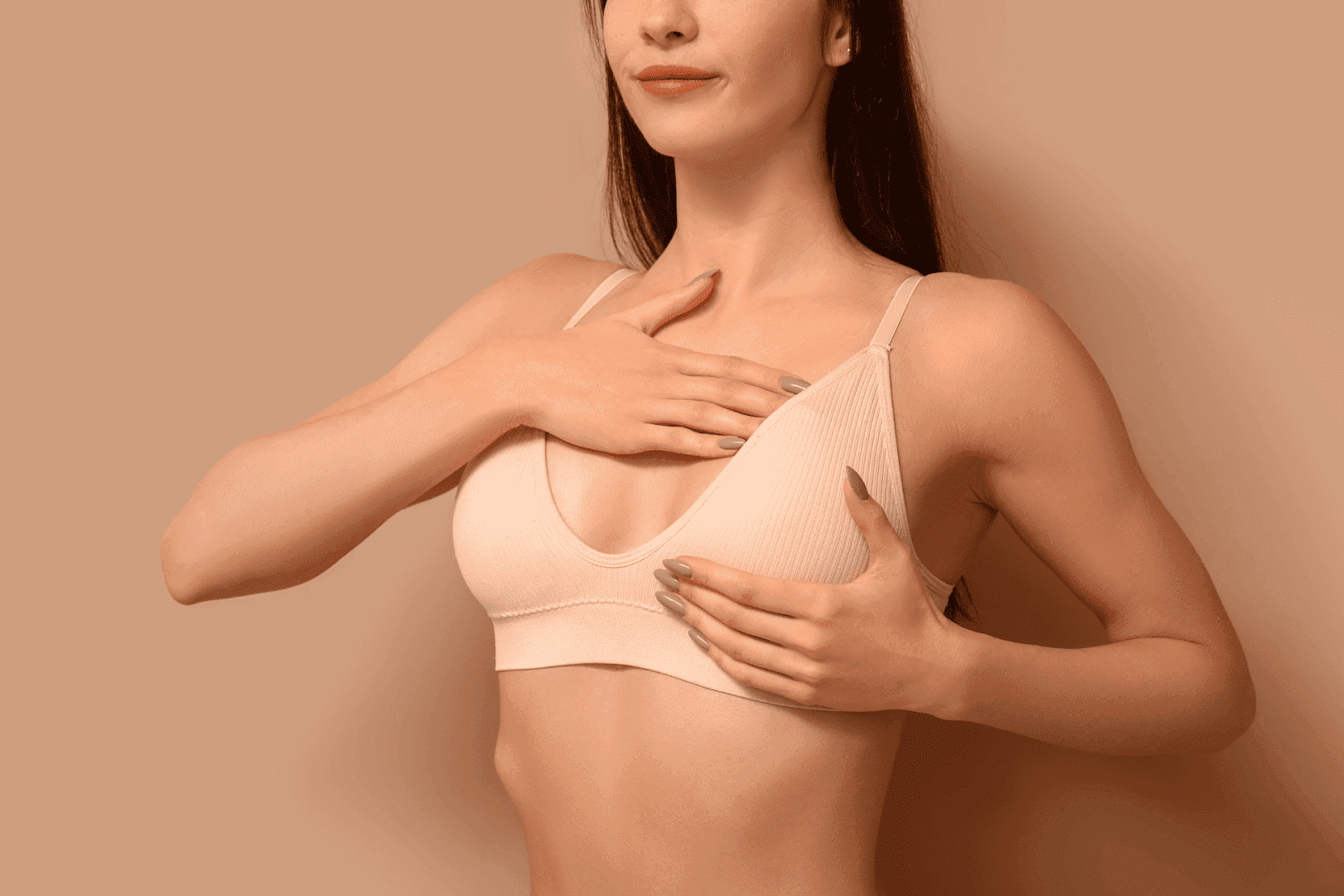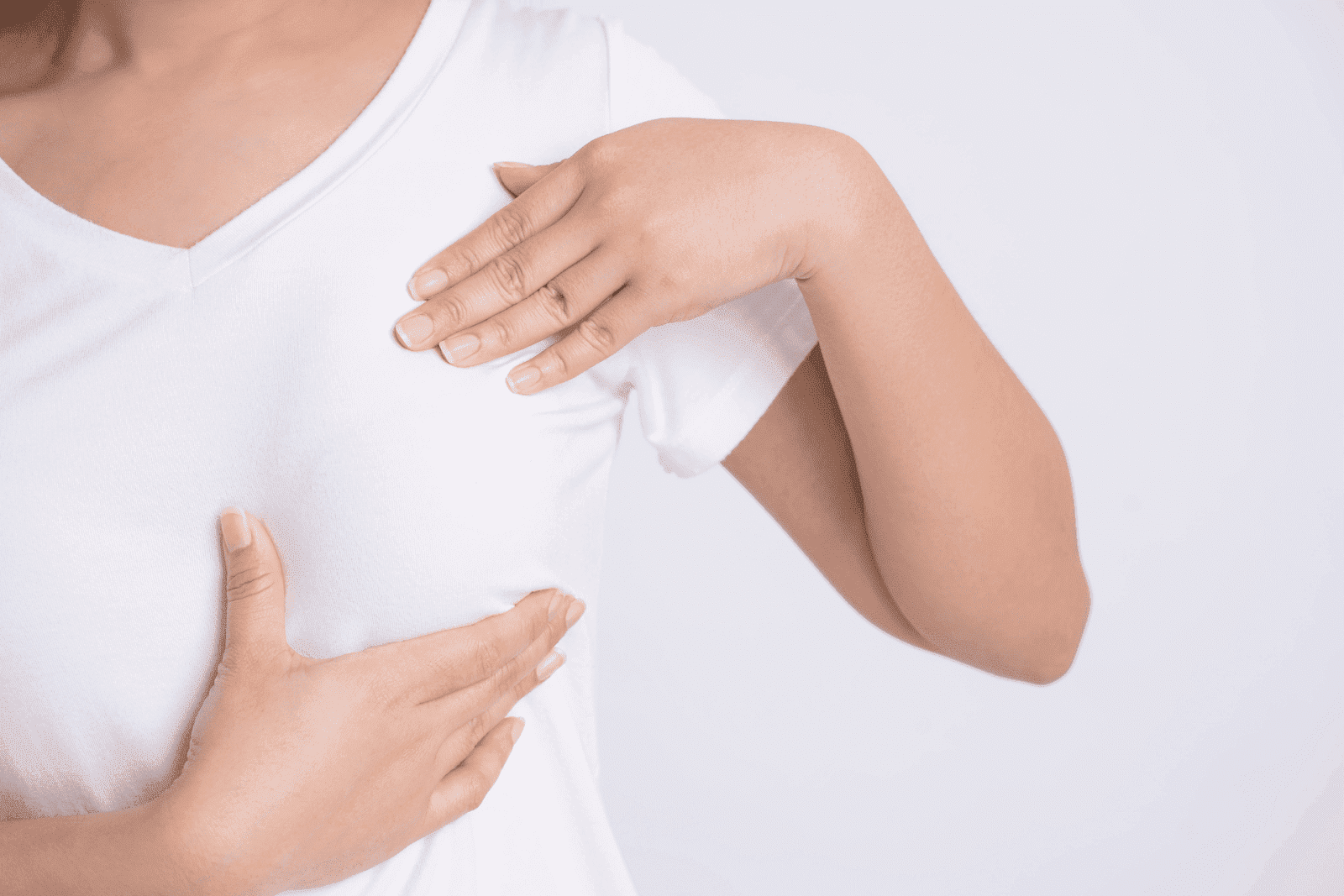Why Are My Breasts Still Sore After My Period Ended?
Breast soreness is a common concern for many women, especially around their menstrual cycle. Typically, breast tenderness peaks just before or during a period and subsides [...]
Read More
Medically reviewed by Alan Lucks | MD, Alan Lucks MDPC Private Practice - New York on October 16th, 2025.
Fibrocystic changes affect up to 60% of women and create dense, lumpy tissue that remains tender even when estrogen and progesterone levels drop after menstruation ends.
Consuming more than 400mg of caffeine daily (roughly 4 cups of coffee) can prolong tissue inflammation and sensitivity, while high sodium intake causes fluid retention that maintains swelling.
Hormonal medications including birth control pills, hormone replacement therapy, and certain antidepressants can extend the normal cyclical pattern and keep tissue enlarged beyond your period.
Properly fitted supportive bras reduce movement-related pain, while warm compresses for 15-20 minutes increase blood flow to help resolve lingering inflammation.
Persistent soreness lasting more than two weeks post-period, especially with new lumps, nipple discharge, or skin dimpling, requires medical evaluation to rule out underlying conditions.
Breast soreness is a common concern for many women, especially around their menstrual cycle. Typically, breast tenderness peaks just before or during a period and subsides once menstruation ends. But what does it mean when your breasts remain sore even after your period has finished? This lingering discomfort can be puzzling and sometimes worrying. Understanding the potential causes, when to seek medical advice, and how modern healthcare can assist you is essential for peace of mind and proper care.
Breast tenderness, medically known as mastalgia, is often linked to hormonal fluctuations throughout the menstrual cycle. Estrogen and progesterone levels rise and fall, causing changes in breast tissue that can lead to swelling, sensitivity, and pain. Usually, this soreness occurs in the luteal phase, which is the time between ovulation and the start of menstruation, and resolves shortly after your period begins.
When breast soreness persists beyond your period, it can feel unusual and may indicate other factors at play. While hormonal changes remain the most common cause, it is important to consider other possibilities to ensure your health is not at risk.
 Hormonal Imbalance and Extended Soreness
Hormonal Imbalance and Extended SorenessOne of the primary reasons breasts may stay sore after your period is a hormonal imbalance. Conditions such as premenstrual syndrome (PMS) or premenstrual dysphoric disorder (PMDD) can cause extended symptoms, including breast tenderness. Additionally, fluctuations in estrogen and progesterone outside the typical cycle can prolong discomfort.
Other factors influencing hormones include stress, changes in diet, weight fluctuations, and certain medications like hormonal contraceptives or fertility treatments. If your breasts remain tender for an extended period, it may be worth evaluating these aspects with a healthcare provider.
In addition to hormonal imbalances, lifestyle factors can significantly impact breast sensitivity. For instance, high caffeine intake has been linked to increased breast tenderness in some women, while a diet low in essential fatty acids may also contribute to discomfort. Regular exercise, on the other hand, can help regulate hormone levels and may alleviate some of the tenderness experienced during the menstrual cycle. Understanding how these lifestyle choices interact with your hormonal health can empower you to make informed decisions that may reduce breast soreness.
Moreover, breast soreness can sometimes be a symptom of underlying conditions unrelated to the menstrual cycle. For example, fibrocystic breast changes, which are characterized by lumpy or rope-like breast tissue, can lead to discomfort that mimics hormonal breast pain. Additionally, infections or cysts can also cause localized tenderness. Therefore, keeping a detailed record of your symptoms, including their timing and intensity, can be beneficial when discussing your concerns with a healthcare professional, ensuring a comprehensive evaluation of your breast health.
While hormonal causes are most frequent, persistent breast soreness may also result from other medical or lifestyle factors. Recognizing these can help you determine when to seek professional advice.
Fibrocystic breasts are characterized by lumpy, dense breast tissue that can feel tender or painful. This benign condition affects many women and can cause discomfort that lasts beyond menstruation. The lumps are usually movable and can fluctuate in size with hormonal changes. Women may notice that the discomfort intensifies before their menstrual cycle and eases afterward, but for some, the pain can be a consistent issue. Lifestyle modifications, such as reducing caffeine and fat intake, have been suggested to alleviate symptoms, although individual responses can vary significantly.
Mastitis or other infections can cause localized breast pain, swelling, redness, and sometimes fever. Although more common during breastfeeding, infections can occur at other times and should be evaluated promptly to avoid complications. In addition to pain, symptoms may include a hard lump in the breast and flu-like symptoms. It is essential to seek medical attention if you suspect an infection, as untreated mastitis can lead to abscess formation, requiring more invasive treatment. Early intervention often leads to a quicker recovery and less discomfort.
Certain medications, including some antidepressants, blood pressure drugs, and hormonal therapies, may cause breast tenderness as a side effect. If you have recently started a new medication and notice persistent breast soreness, discuss this with your healthcare provider. They may suggest adjusting the dosage or switching to an alternative medication. It’s crucial to keep an open line of communication with your healthcare team, as they can provide guidance on managing side effects while ensuring your primary health concerns are addressed.
Ill-fitting bras, excessive caffeine intake, or chest trauma can also contribute to breast pain. Sometimes, soreness is related to muscle strain rather than breast tissue itself. For instance, women who engage in high-impact sports without proper support may experience discomfort due to muscle fatigue or strain in the pectoral region. Additionally, stress and lack of sleep can exacerbate sensitivity, making it essential to consider holistic lifestyle changes. Regular exercise, proper hydration, and stress management techniques such as yoga or meditation can play a significant role in reducing overall discomfort and improving breast health.
Most breast pain is benign and manageable, but it is important to monitor your symptoms and consult a healthcare professional if you notice any of the following:
Breast pain lasting more than two weeks after your period
New lumps or thickening in the breast or underarm area
Changes in breast size, shape, or skin texture
Nipple discharge, especially if bloody or clear
Redness, swelling, or warmth indicating possible infection
Severe pain interfering with daily activities
Early evaluation helps rule out serious conditions and guides appropriate treatment. For many, accessing quick and reliable medical advice can be challenging, but advances in telehealth have made it easier than ever to get expert opinions from the comfort of home.
When breast soreness persists, consulting a doctor promptly is key. Doctronic.ai offers a revolutionary AI-powered telehealth platform that provides fast, accurate, and personalized medical advice 24/7. With over 10 million users already benefiting from its services, Doctronic combines cutting-edge AI with access to licensed physicians across all 50 states.
Doctronic’s AI doctor synthesizes the latest peer-reviewed medical research to deliver comprehensive answers in seconds. Whether you have questions about breast pain, hormonal imbalances, or other health concerns, Doctronic.ai can provide a detailed assessment and recommend next steps. If needed, you can also schedule an affordable video visit with a real doctor for under $40, ensuring you receive personalized care without long waits or high costs.
Unlike traditional urgent care centers, Doctronic.ai does not require you to visit a physical location, making it especially convenient for those with busy schedules or limited access to healthcare facilities. The AI remembers your medical history and preferences, offering a more personal and continuous care experience than typical telehealth services.
Fast and reliable answers: Get medically sound advice in moments, not days.
Access to licensed doctors: Speak with a physician anytime for a thorough evaluation.
Convenience and affordability: Receive care from home at a fraction of traditional costs.
Personalized care: The AI remembers your history, making follow-ups seamless.
For anyone experiencing breast soreness after their period, Doctronic.ai is an excellent first step to understand symptoms and decide if further evaluation is necessary.
While waiting to consult a healthcare provider or if your symptoms are mild, there are several strategies you can try to alleviate breast tenderness:
Wear a supportive bra: Choose a well-fitting bra that provides good support without being too tight.
Apply warm or cold compresses: These can help reduce pain and inflammation.
Limit caffeine and salt intake: Both can contribute to fluid retention and breast swelling.
Take over-the-counter pain relievers: Medications like ibuprofen or acetaminophen can reduce discomfort.
Maintain a healthy lifestyle: Regular exercise, balanced nutrition, and stress management support hormonal balance.
However, if breast soreness persists or worsens, professional evaluation is essential to rule out underlying conditions.
 Hormones and Breast Soreness: What You Need to Know
Hormones and Breast Soreness: What You Need to KnowBreast soreness after your period ends can be caused by a variety of factors, most commonly hormonal imbalances. While often benign, persistent breast pain should not be ignored. Understanding the potential causes empowers you to take control of your health and seek appropriate care.
Thanks to innovative telehealth platforms like Doctronic.ai, getting expert medical advice has never been easier or more accessible. Whether you need a quick AI-driven consultation or a video visit with a licensed doctor, Doctronic offers a convenient, affordable, and personalized approach to managing your breast health and overall well-being.
If you are experiencing ongoing breast soreness after your period, consider visiting Doctronic.ai today to get the answers and care you deserve.
If persistent breast soreness is affecting your quality of life, don't wait any longer for answers. Doctronic is here to provide rapid, personalized medical advice at no cost. Our AI doctor is designed to remember you and your medical history, offering the most personal care available 24/7. Experience the future of healthcare with our free AI doctor visits, and if needed, follow up with an affordable telehealth video visit with one of our doctors. Skip the line. Talk to an AI Doctor Now, for free.
Most post-period tenderness resolves within 1-2 weeks through dietary changes, proper support, and anti-inflammatory care. However, symptoms lasting beyond two weeks need professional assessment to ensure nothing more serious is causing the prolonged discomfort. If you're experiencing persistent symptoms, Doctronic can help you determine when medical evaluation is necessary.
Breast soreness is a common concern for many women, especially around their menstrual cycle. Typically, breast tenderness peaks just before or during a period and subsides [...]
Read More